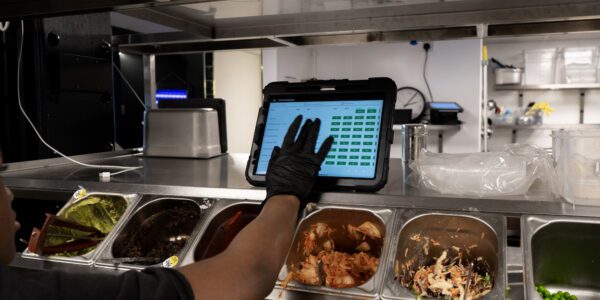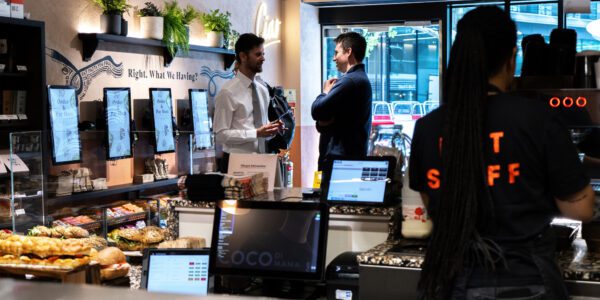The role of technology in driving efficiency
A look at technology’s role in driving efficiency for hospitality operations, and strategies you can implement today to get the most out of your tech.

Discover why fast-food giants like McDonald’s and KFC have been using self ordering kiosks for more than a decade in our guide below.
From LEON to YO!, self service kiosks have become a staple piece of hospitality tech. And it’s official: customers love them. They’re fast, easy-to-use and make personalisation a breeze. No longer a nice-to-have, self serve kiosks are a vital part of the quick service restaurant ecosystem.
And they’re great for operators too. Not only will they free up your staff, they’ll increase your average order value, improve order accuracy and cut down those long queues for the till during peak times.
And with labour costing more than ever thanks to increases in the minimum and national wages, the savings self order kiosks can bring to your operation will become crucial.
It’s no wonder, more and more operators across the sector are installing self service kiosks. Read on to find out seven incredible benefits, and to discover why kiosks reach their full potential as part of a centralised, single tech system.

Put simply, customers spend more using self service kiosks.
A good kiosk experience lets customers explore the whole menu, providing enticing images, thorough meal details and a full range of optional extras. Kiosks never forget to upsell with sides, meal deals and targeted promotions through through loyalty programmes. Without the pressure of people behind queuing for the till, customers have more freedom and time to browse the full menu, ensuring they get the meal they really want.
61% of customers spend more when placing orders through kiosk solutions compared to ordering at the till.

A win-win for your customers and your operation
Book a chat with a hospitality expert and find out how to get kiosks right, and start scaling your business.
The beauty of kiosks is that they allow operators to effectively outsource order taking to their customers.
With the industry facing unprecedented costs of labour, self ordering kiosks can help alleviate external pressures. By redeploying staff to back-of-house operations or customer support roles, you’ll increase throughput, speed up meal preparation and create a better customer experience. Plus, with customers self ordering, operators can cut back on staffing costs by reducing the number of staff they have on shift during quieter periods.

People queuing round the corner to buy your food might feel good, but the reality is it’s probably costing you sales.

81% of customers find restaurant queues frustrating, with 61% admitting they’d leave and go elsewhere if they had to wait more than 10 minutes. In the traditional QSR set-up, taking orders often becomes an operational bottleneck, limiting takings during peak hours. Self service kiosks increase order-taking capacity exponentially; reducing wait times, attracting more customers and allowing operators to take more orders than through an EPOS.
Smart use of kiosks can cut queues by up to 50% and reduce the risk of losing customers to the back of the queue during peak hours.

With the customer in control of inputting their order, there is less risk of time-strapped cashiers mishearing or misinterpreting an order, reducing overall margin for error. This is vital for customers with allergies.
87% of customers said they feel more relaxed ordering at a kiosk which means they’re less pressured to make rushed decisions. People take their time when ordering on kiosks and are more likely to look through the full menu, adding customisations and extras without fear of perceived judgement.

Kiosks aren’t just powerful tools for processing orders.
The best brands are thinking about how kiosks play a role in their broader omnichannel strategy. Today’s consumers want a consistent experience across multiple channels, and the flexibility to choose the right channel at the right time. By integrating kiosks into your wider ecosystem, you get valuable data on how your customers are behaving across different ordering channels. Capturing that data enables you to create personalised and targeted promotions for your customers, increasing loyalty and overall customer spend.

Kiosk screens are designed to be easily customised with plug & play connections, including ePDQs, QR code scanners, and other devices that ‘snap on’ to the side of the kiosk. This massively increases flexibility for operators – restaurants can adapt their kiosk solution without having to buy new hardware. It also enables operators to be more agile, as new functionality can be live in days and weeks, rather than months.
The hospitality industry is feeling the squeeze. With labour costs at an all-time high, many operators are looking for a quick fix to protect margins.
But it’s not as easy as cutting staff. Operators need solutions that transform how they operate with fewer people.
That’s where kiosks can make a real difference. Restaurants using them experience benefits beyond the bottom line:
Restaurants using kiosks aren’t just surviving—they’re building stronger, more profitable operations.
Want to see how kiosks can transform your restaurant? Let’s talk…
Ready to scale your business with kiosks? Book a demo and discover how you can increase revenue, operate more efficiently, and build the foundations for long-term growth.
A look at technology’s role in driving efficiency for hospitality operations, and strategies you can implement today to get the most out of your tech.


The right hospitality tech partner does more than provide software. They collaborate, innovate, and scale with your business.
